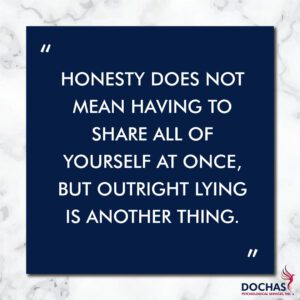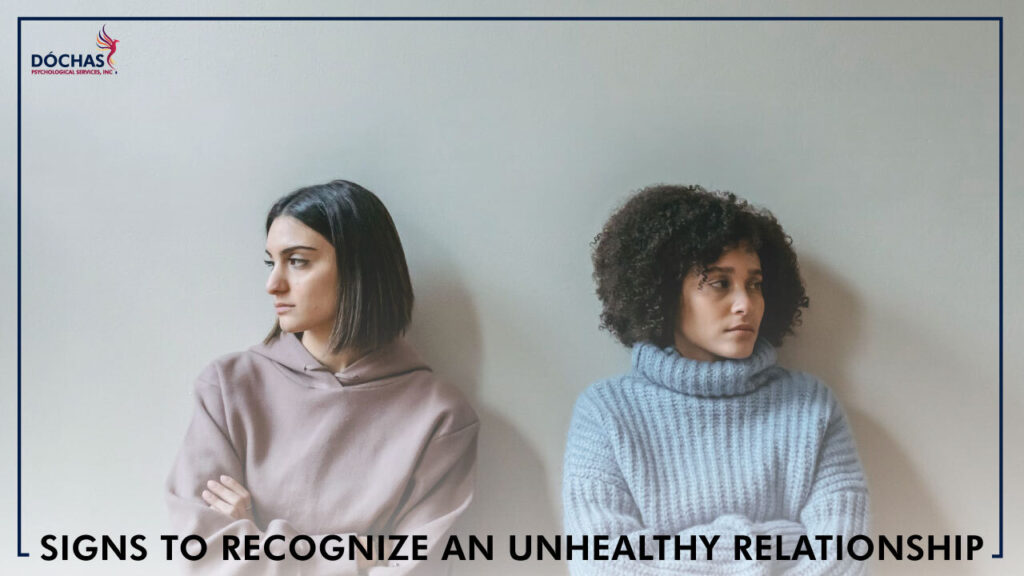Hey everyone, Kassandra and Schareen here on the Dóchas blog! This year has been tough on a lot of us—financially, emotionally, psychically—the list seems endless! It has been especially hard on relationships, as increased stress and uncertainty have caused strain between loved ones and families. But how do you know if the relationship issues you are having are normal day-to-day squabbles or a sign that something deeper is going on? What are some signs of an unhealthy relationship? If you find yourself asking this question a lot, this article might help you make sense of what is and isn’t a red flag.
Often when we talk about unhealthy relationships, we think of romantic ones but it is important to remember to check in with your social and familial relationships also. These platonic relationships are the ones that sustain us, support us, and teach us what we want (and don’t) from our romantic partners. So, it is just as important to feel respected in these relationships. You deserve to surround yourself with relationships that lift you up, not bring you down.
The following list is not a pass/fail type test, but a list of areas we recommend looking at to explore how you feel about your relationship. It is important to remember that you and your loved one are the experts of your relationship. So, this is is whatever you need it to be: a fun five-minute read between chores, food for thought as you navigate your daily life, an indication that it may be time to reach out and get support to improve your relationship, or a way to make peace with the idea of saying goodbye.
So without further ado here are some relationship areas we feel it is important to check in on:
Signs of an Unhealthy Relationship
Level of support
Do you feel supported within your relationship? If this is a simple yes, then awesome because you deserve it. If, however, you feel as though this area is lacking, it may be a sign to explore what you are missing within the relationship. Perhaps you feel as though you are taking more responsibility for the relationship (like always being the first to call, or taking on more responsibilities around the house). Perhaps they made a hurtful comment after you shared some exciting news. Or perhaps you can’t quite put your finger on the ‘why’ but you just know you don’t feel as supported as you’d like to be.
Sometimes a simple discussion with your loved one could be all you need to get things back on track, and other times this may be a sign that you need to rethink the type of relationship you have with this person.

Toxic communication
How do you and your loved one communicate with each other? Do you feel heard? Do you listen to understand, or do you listen to respond? Often when we get into the habit of fighting for ourselves or defending ourselves, this can breed toxic communication patterns that are not healthy for anyone.
Jealousy and controlling behaviours
Some examples of controlling behaviours include:
- calling/texting constantly to ‘check-in’ when they are not with you
- asking for an itinerary when you go out
- checking your phone! (When did this become okay?!)
- using guilt to make you feel bad when they cannot be involved with what you’re doing.
Resentment
Resentment might look like holding on to old fights, keeping score of what they did for you or you did for them, and feeling underappreciated. Resentment within a relationship can be a good indication that something is not healthy between the two of you.
Dishonesty
This is a big one! As mental health providers, we often have to clarify what honesty means in a relationship. Let’s be clear: being honest with your partner does not mean you have to share everything with them all the time, especially at the beginning of your relationship as you are getting to know each other. In fact, disclosing too much too soon could be a sign of trauma dumping or love bombing, both bad for a relationship.
Honesty is about being open with your partner about where you are at in the relationship, which can include saying “you know what, I’m not sure I’m ready to share that yet, but I will let you know when I am.” Your partner should be able to respect your space, and this may even make you feel closer to them in the long run. When you respect each other’s emotional space it subtly lets you know this is someone I can trust so when I do share more with them I know they will treat my secret with respect.
Honesty does not mean having to share ALL of yourself at once, but outright lying is another thing. If your partner is evasive, tells you one thing but does another, and is obviously selling you a tired old tale, it might be time to take a step back.

Negative financial behaviours
This includes controlling how you spend your money, as well as excessive spending. This can also be a pattern in an unhealthy relationship.
Intimacy pressures
You might have already heard that all of us have individual ways of giving or receiving love, or “love languages.” In some relationships, physical touch may be a trigger for one partner. If you are feeling as though you are being pressured into physical touch (like having to kiss or hug when you don’t want to, or doing sexual acts that you don’t want to do) this could be a red flag.
What to Do About These Signs of an Unhealthy Relationship
These are just some of the signs you might look for. We hope this helps you think about your relationship and sort out whether it feels normal, or unhealthy.
If you are feeling like your relationship is leaning toward the unhealthy, we have some great resources that can help, like how to prepare for a tough conversation, or how to set boundaries. Sometimes a simple conversation can get your relationship back on track, and other times you may realize you need to step away.
Sometimes the red flags in relationships are more serious. Take a look at our blog on understanding domestic violence if you think this might be the case. If you need immediate help, there are online chat and 24/7 phone helplines here.
If you need more information on unhealthy relationships, or if you are seeking further advice and guidance, you can book an appointment with one of our psychologists at Dochas. You can get in touch with us by calling us at 780 446 0300 or emailing info@dochaspsych.com. If you’d like to email one of us directly, Kassandra’s email is kmalik@dochaspsych.com, and Schareen’s is smaher@dochaspsych.com.
About Dóchas Psychological
Dóchas Psychological Services is a well-established and trusted therapy clinic located in Spruce Grove, Alberta. At Dóchas we value the idea that everyone deserves a safe space. Through connection and education, our team works hard to build a trustworthy relationship with each of our clients. It is our goal to create a community for our clients to feel like they belong.
Disclaimer
Information provided through Dóchas Psychological Services blogs or vlogs is meant for educational purposes only. They are NOT medical or mental health advice. You can read more about our disclaimer here.

